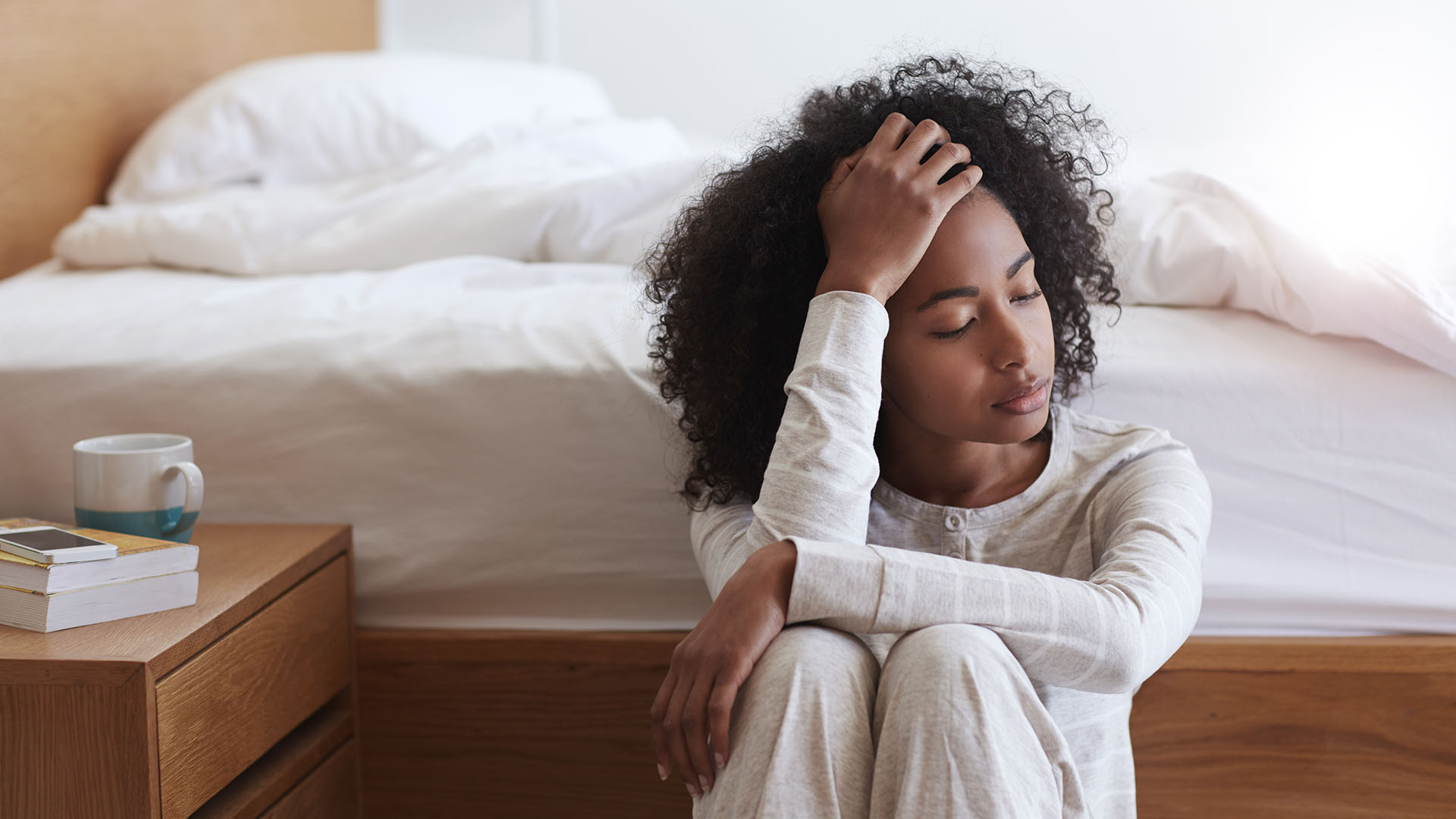How to sleep when you're stressed: 4 techniques to try
Can't sleep when you're stressed? Here are four techniques to try

Sign up for breaking news, reviews, opinion, top tech deals, and more.
You are now subscribed
Your newsletter sign-up was successful
If you're wondering how to sleep when you're stressed, we explore the many causes of stress, how it impacts our bodies as we try to fall into a slumber and the clever techniques we can use to relax our bodies and make us calm enough for sleep.
If you think it's just you who can't sleep because of stress, you're not alone; according to Mental Health America nearly two-thirds of Americans reveal that stress causes them to lose sleep most nights.
Daily stresses such as money worries, work and emotional stress can impact our quality of sleep – meaning either we can't fall asleep, we wake up at night or find it hard to get the recommended six-to-eight hours of sleep for a healthy body and mind, even with the best mattress providing plenty of comfort and support.
Why does stress effect sleep?
"Most of us work long hours and have never-ending to-do lists – then we take that pressure and internalize it," explains Amy Korn-Reavis, sleep specialist coach at BetterUp.
"Our brain compartmentalizes it and then when we lie down, decides to take that information and problem solve it. Whereas, what we need to do is take time to unwind and de-stress at night, so we can fall asleep faster and feel better when we wake up."
But why does stress have such an impact on your sleep? Stress releases a hormone called cortisol, which affects our sleep cycle, making us more wired and awake in the evening, then because of the lack of sleep we suffer from low energy in the morning. If we continue to stay stressed throughout the day, the sleep debt cycle debt will continue.
So, how can we break the cycle? Here we look at four techniques, way better than counting sheep, to help you sleep like a baby in no time.
Sign up for breaking news, reviews, opinion, top tech deals, and more.
How to sleep when you're stressed: 4 expert tips
1. Pull a weighted blanket over you
If anxiety is the primary reason for your stress and sleepless nights, one of the best weighted blankets could help to calm you as you fall asleep. A weighted blanket creates a sensory calming feel as we fall asleep, almost like being hugged. The blankets are made from small squares of material which contain glass beads – which give the blankets a heavy, but comforting feel.
Hope Bastine, psychologist and sleep expert at Simba explains: "There is burgeoning evidence suggesting being enveloped in a heavy cocoon can lower anxiety and stress levels. Weighted blankets, harness the science of 'deep pressure therapy'.
"Deep pressure therapy is a sensation we experience when we are hugged, squeezed, stroked, or simply held. It counters stress by helping your nervous system switch from 'fight or flight' to 'rest and relax'." Head to our article on weighted blankets for anxiety for more info.

2. Listen to stories
Remember when we'd fall asleep to a bedtime story told by our parents? Well, there's a reason why it worked, and it wasn't just because we were tired, says Bastine: it's because it provides our minds with a way to stop thinking about the stresses of the day.
"When our mind is swirling with the facts and thoughts of the day, stories help us shift down a gear before bed. They enable us to bypass those frustrating feelings of over-thinking ('analysis paralysis') and the 'sleep paradox' (the more you try to sleep, the more elusive sleep becomes). This is because our visual cortex and occipital lobe are engaged in imagination, so the analytical pre-frontal cortex quietens down."
She goes on to explain why this technique could help you break your sleep debt cycle and nod off quickly: "The evocative journey that literature takes us on serves many purposes for adults and children alike. Embedding stories into our pre-sleep ritual can not only help us to let go of stress, but it provides a bridge for our conscious mind to step over to dreamland."
3. Breathwork and meditation
If you've never tried breathwork or meditation before it's easy to get started – with thousands of free videos on YouTube and other video-sharing platforms. Apps such as Calm and Headspace also have specific sleep meditations, which guide you through resetting your mind and clearing out the stresses of the day.
But, how does mediation help to induce sleep? It quickly helps your mind to slow down and focus on the present, rather than all the stresses of the day. While a study by the National Institute of Mental Health in 2019 showed that mindfulness meditation helps to induce sleep.
Breathwork is similar to meditation – and uses the breath to regulate the nervous system, calming the body to help induce sleep. "The body is a delicate instrument and the mind needs to be calmed to allow a state of relaxation which in turn will allow more restful sleep," says Matt Berger, founder of the Melo breathing device.
"By breathing correctly and focusing on lowering your heart rate this will distract and in turn will increase your sense of wellbeing. The goal is to make sure your body is controlling your mind, taking away any stress or thoughts you may have before bedtime."
Berger says you can use several different patterns when it comes to breathwork, however, a simple formation is to breathe in for 4 seconds and exhale for 4 seconds – repeating it for as long as you need.
4. The military sleep method and body scanning
Methods which help you focus on the present are also great techniques to help you fall asleep when you're stressed. The military sleep method and a body scan are very similar and involve you concentrating on certain parts of your body at one time, normally starting with the most stressed part of the body - such as the shoulders.
Take 10-15 seconds to notice how you feel in that part of your body and then make a conscious effort to relax it. Move on to the rest of your body, not forgetting places which hold a lot of stress such as the jaw and your glutes. You may fall asleep while you're doing it, if not, go back to the most stressed parts of your body and repeat. The military sleep method also finishes with some visualization – imagine yourself in a canoe on a calm lake, or in a forest with nature around you - and before you know it you'll have slipped into a restful slumber.
Read more:
- How to sleep on a plane and wake up refreshed
- 8 products to help you sleep cool and stop overheating at night
- How to sleep better: 16 sleep tips, techniques and hacks

Sarah is a freelance writer - writing across titles including Woman&Home, Fit&Well, TechRadar, the Independent and the BBC. She covers a variety of subjects, including trends in beauty, business and wellness - but her biggest passions are travel and fitness. She can normally be found trying out the latest fitness class or on a plane to an exotic destination. While she loves to combine the two - signing up to do hiking holidays in LA, intense boot camps in Bali - last year she went on her dream activity holiday: paddleboarding around deserted islands in Croatia.